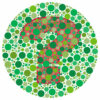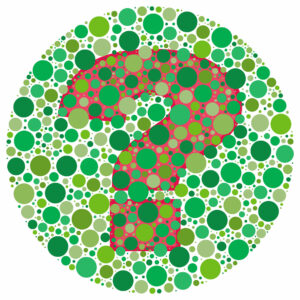
Vision Decline in Old Age Affects Ability to See Color
The loss of visual acuity as you age can be a difficult realization. This is something we all know we’ll have to deal with at some point. But, now research is showing that this isn’t the only age-related change in your vision. Studies have revealed that your ability to see color also declines in old age. These studies noted that color vision decline starts around 70 years old and greatly decreases from there.
Color blindness or a decline in color vision may not seem like a big deal at 70 years old. However, when compounded with gradual age-related visual acuity loss, this additional difficulty distinguishing between colors may make getting around that much more difficult. So, is there anything you can do to prevent this color vision decline as you age?
Why Does Color Vision Decline?
 The revelation that color vision experiences a significant decline as we age isn’t particularly new, but the discovery of the specifics of that decline is. Scientists now know the scale and colors affected by color blindness.
The revelation that color vision experiences a significant decline as we age isn’t particularly new, but the discovery of the specifics of that decline is. Scientists now know the scale and colors affected by color blindness.
The most affected color spectrum was the blue-yellow spectrum, while the red-green spectrum was significantly less prevalent. It’s interesting to note that inherited color blindness greatly affects the red-green spectrum, so this age-related color vision decline clearly has roots in different areas of the vision field and visual centers of the brain.
So, why are the elderly experiencing these color vision declines? And, can we prevent or reduce the impact of this decline? At Rebuild Your Vision, we are all about improving and preserving vision naturally as we age, so let’s talk about what we can do to prevent this from happening.
Causes of Color Vision Loss in Old Age
First, let’s talk about the root causes of color vision decline. The loss of color vision in old age is difficult to pin down. As mentioned, a decline in eyesight is common as you age. Just like every other part of the body, the eyes age and you begin to notice a change in the way that they work, how clear they are, and more importantly, how clear your vision is. Your body stops producing some of the key nutrients that are needed to preserve your vision, meaning that if you want to keep your eyes working well, you’ll need to step in. While age-related visual decline isn’t preventable, how much visual acuity is lost and when these changes set in, does seem to be within a person’s control.
Research into the decline of color vision during old age suggests that cataracts and retinal disease cause color vision loss, in addition to normal aging factors. Nutritional deficiencies also play a role in vision decline, both age-related and otherwise. Luckily, we don’t have to sit back and let cataracts and age-related decline to occur; there are steps we can take in the fight to prevent these conditions, including maintaining a healthy, nutritional diet.
Cataract Prevention to Prevent Vision Decline
If there’s one eye issue that doctors are pretty comfortable treating, it’s cataracts. So what is a cataract? Cataracts are the clouding of the lens of the eye. While light normally passes directly through the eye, the cataract causes the light to scatter, clouding your vision. Cataracts are also the most common cause of blindness in adults 55 and over. Cataracts can also cause color blindness, as we mentioned before.
So what can you do to prevent cataracts? The first step is easy – if you’re a smoker, quit now. Smoking is known to cause cataracts, so one of the best ways to prevent them from happening is to stop smoking, or never start in the first place.
You can also prevent vision decline by preventing cataracts by increasing your carotenoid intake. You can find carotenoids in dark, leafy greens and bright red and orange fruits and vegetables. The carotenoids prevent oxidation in your eyes, which causes cataracts to form in the first place.
Staving Off Color Vision Loss and Prolonging Visual Acuity
While aging is something we can’t change, there is a lot we can do to rebuild our vision and hold on to our visual ability. Leading a healthy life is a huge part of having and maintaining healthy eyes. You may not think that exercise could play a role in the health of your eyes. but the body functions as a whole. When your body is healthier, so are your eyes.
Along these same lines, a healthy diet that is rich in vitamins, minerals, and herbs that support the health of the eyes is essential. Sadly, even with an amazing diet, you may not be getting the types or quantities of nutrients you need to encourage eye health and stave off the onset of age-related vision decline.
Supplements to Prevent Vision Decline
Taking a regular supplement will ensure that you’re getting the right vitamins, nutrients, and herbs. It will also make sure that you’re getting them on a regular basis. There are actually 17 different nutrients, vitamins, and herbal supplements that have been found to assist in not only maintaining good eye health, but in rebuilding the health and strength of your eyes and your sight. The best part about taking Rebuild Your Vision Ocu-Plus vitamins is that they include all 17 of those vitamins and nutrients in one easy-to-swallow capsule.
Some important nutrients include alpha lipoic acid, chromium, ginkgo Biloba, N-acetyl cysteine, selenium, bilberry, quercetin, and vitamin A. These nutrients have shown incredible promise in preventing and treating cataracts, age-related macular degeneration, and glaucoma. They also encourage overall, lasting eye health.
The added perk? Taking these essential supplements not only helps to save your color vision, but it also serves to save your visual acuity. You’re more likely to have healthier eyes and eyesight because you’re nourishing the eyes. Furthermore, starting on these supplements from an early age will greatly help to provide continual protection as you age. If you take steps to preserve and improve your vision now, you’ll have a better quality of life down the road. So, you should get started today!
Our Rebuild Your Vision Ocu-Plus Formula Contains All 17 Vitamins, Minerals, and Herbal Supplements to Improve Your Eye Health!












Tyler, you wrote an interesting post! Since your eyes are such an essential part of your health, it is critical to maintain a healthy lifestyle to have healthy eyes. Maintaining a healthy weight, a regular exercise regimen, wearing protective eyewear when out in the sun, stopping smoking, and consuming a nutritious diet are all strategies to keep your eyes healthy. Furthermore, getting a full dilated eye exam every year after 60 years of age is essential. It will assist your doctor in detecting any eye illness at an early stage.
Informative blog. Keep sharing.
I hv an medical test In Indian airforce for color blindness…I hv an problem in color blindness so plssssssss tell me some instructions to cure it….
I have been doing this ever since my stroke in 2006, when I lost half of my vision.The eye docotor I use can’t get over how healthy my eyes are even though I have the vision loss.So wehn my husband came home and his eye doctor told him he had the starting of macular degeneration. but since he is 75 that age will get him down befrore he loses all his vision, I immediately got him started on this also.Thank you so much for producing such a fine product.Bev.Precht
Congratulations on your success and please give our best to your husband. We love hearing stories like this and hope that you keep us updated.